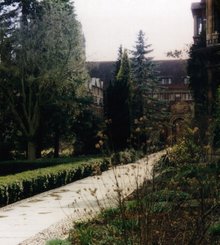Pembroke College, Cambridge
|
|
Template:Oxbridge College Infobox Pembroke College is a college of the University of Cambridge, home to over 600 students and fellows, and is the third oldest of the existing colleges.
| Contents |
History
On Christmas Eve 1347, Edward III granted Marie de St Pol, widow of the Earl of Pembroke, the licence for the foundation of a new educational establishment in the young university at Cambridge. The Hall of Marie Valence, as it was originally known, was thus founded to house a body of students and fellows.
The statutes were notable in that they both gave preference to students born in France who had already studied elsewhere in England, and that they required students to report fellow students if they indulged in excessive drinking or visited disreputable houses!
The college was later renamed Pembroke House, and finally became Pembroke College in 1856.
Buildings
The first buildings were comprised of a single court (now called Old Court) containing all the component parts of a college - chapel, hall, kitchen and buttery, master's lodgings, students' rooms - and the statutes provided for a manciple, a cook, a barber and a laundress. Both the founding of the college and the building of the city's first college chapel (1355) required the grant of a papal bull.
The original court was the university's smallest at only 95 feet by 55 feet, but was enlarged to its current size in the nineteenth century by demolishing the south range.
The college's gatehouse, however, is original and is the oldest in Cambridge. The Hall was rebuilt in the nineteenth century by Alfred Waterhouse after he had declared the existing one unsafe.
The original chapel now forms the Old Library and has a striking seventeenth century plaster ceiling, designed by Henry Doogood, showing birds flying overhead. Around the Civil War, one of Pembroke's fellows and Chaplain to the future Charles I, Mathew Wren, was imprisoned by Oliver Cromwell. On his release after eighteen years he fulfilled a promise by hiring his nephew Christopher Wren to build a great chapel in his former college. The resulting chapel was consecrated on St Mathew's Day, 1665, and the eastern end was extended by George Gilbert Scott in 1880.
Pembroke's enclosed grounds also house some particularly well-kept gardens, sporting a huge array of carefully-selected vegetation. Highlights include "The Orchard" (a patch of semi-wild ground in the centre of the college), an impressive row of Plane Trees and an immaculately-kept bowling green which is reputed to be the oldest in Europe.
Pembroke_College,_Cambridge.jpg
Famous alumni of Pembroke College
- William Eliot (Politician)
- Thomas Gray (Poet)
- Ted Hughes (Poet)
- Eric Idle (Entertainer)
- Clive James (Novelist)
- William Pitt (Politician)
- Tom Sharpe (Novelist)
- Edmund Spenser (Poet)
- George Gabriel Stokes (Physicist)
- William Turner (Physician)
- Bill Oddie (Comedian and Bird-Watcher)
- Tim Brooke-Taylor (Comedian)
- Chris Smith (Politician)
- Peter Cook (Comedian)
Pembroke Today
Pembroke college has both graduate and undergraduate students. The undergraduate student body is represented by the junior parlour comittee (JP). The graduate community is represented by the graduate parlour committee (GP). There are many clubs and societies organised by the students of the college.
External link
- A virtual tour of the college (http://www.pem.cam.ac.uk/virtual/index.html)
- The Pembroke Players dramatic club (http://www.pembrokeplayers.org)
| Colleges of the University of Cambridge | 
|
|---|---|
|
Christ's | Churchill | Clare | Clare Hall | Corpus Christi | Darwin | Downing | Emmanuel | Fitzwilliam | Girton | Gonville and Caius | Homerton | Hughes Hall | Jesus | King's | Lucy Cavendish | Magdalene | New Hall | Newnham | Pembroke | Peterhouse | Queens' | Robinson | St Catharine's | St Edmund's | St John's | Selwyn | Sidney Sussex | Trinity | Trinity Hall | Wolfson | |

